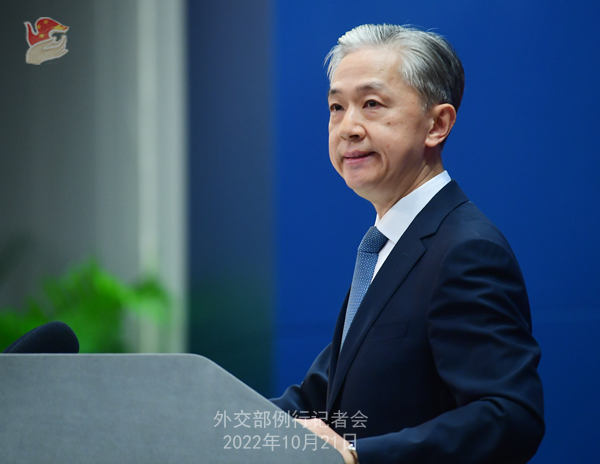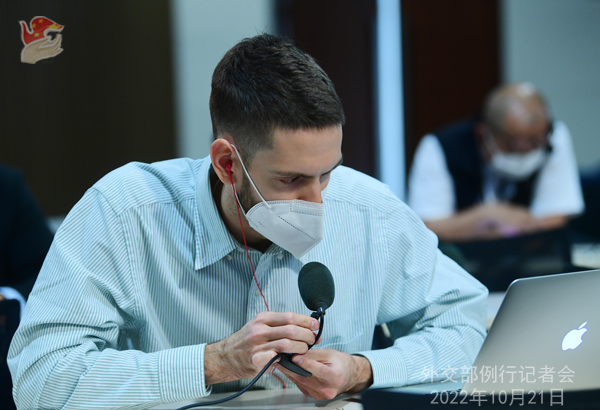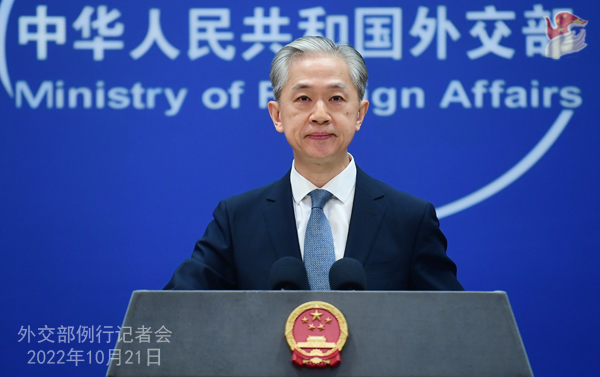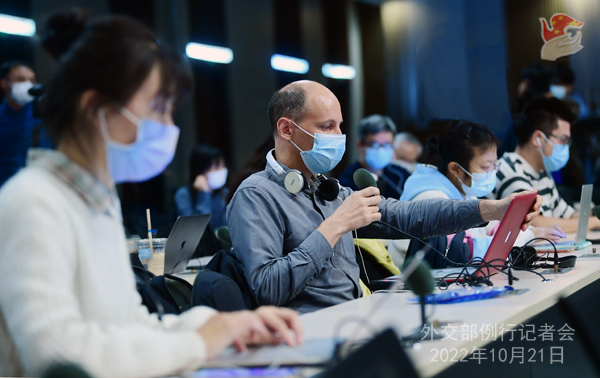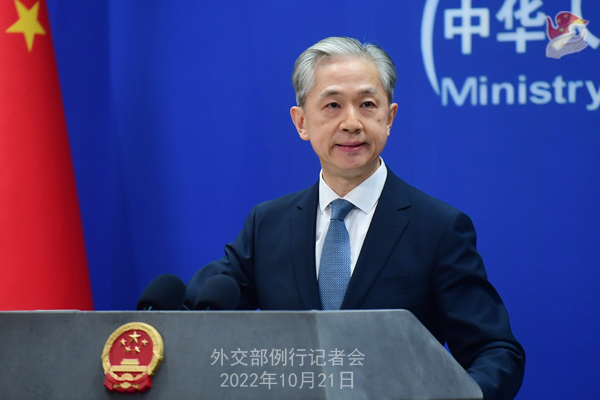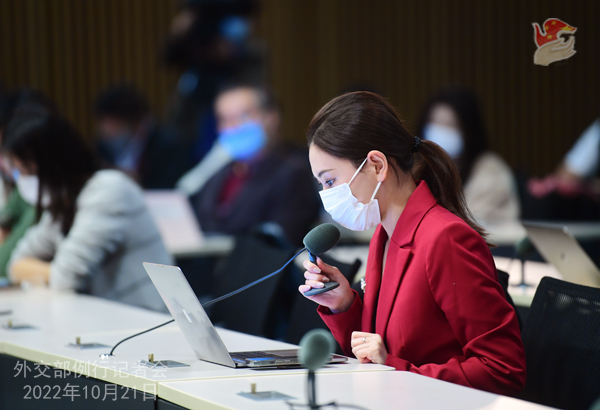| Foreign Ministry Spokesperson Wang Wenbin’s Regular Press Conference on October 21, 2022 |
| 2022-10-21 21:44 |
|
CCTV: Since the 18th National Congress of the CPC, China has made notable progress on the path of human rights development suitable for its national conditions. Can you share more information with us? Wang Wenbin: Ever since its founding, the CPC has attached great importance to respecting and protecting human rights. A happy life for all is the biggest human right. To seek happiness for the Chinese people has always been an unswerving aspiration of Chinese communists. Since the 18th National Congress of the CPC, the CPC Central Committee with Comrade Xi Jinping at its core has put respecting and protecting human rights high on its governance agenda and made historical achievements in China’s human rights advancement. China has completed the building of a moderately prosperous society in all respects and secured a historical success in eradicating absolute poverty. Facing the raging COVID-19 pandemic, we have put people’s life and health first, and protected people’s life and health to the greatest possible extent. The average life expectancy in China has gone up to 78.2 years from 74.8 years from a decade ago. We have put in place the world’s largest education system, social security system and health care system. The coverage of nine-year compulsory education in China has surpassed the average of high-income countries. Access to higher education is becoming universal, giving everyone the chance of excelling themselves and making dreams come true. China is the only major country that has formulated and implemented four consecutive national human rights action plans. Human rights protection is emphasized in all aspects of governance including legislation, administration and work of the judiciary. People’s rights are protected by the rule of law. We have ensured a more complete and lasting sense of fulfillment, happiness and security for our people. China has taken an active part in global human rights governance. The United Nations Human Rights Council (UNHRC) has adopted three times the resolutions on “the contribution of development to the enjoyment of all human rights” and “promoting mutually beneficial cooperation in the field of human rights” submitted by China. The concept of promoting human rights through development and cooperation has gained strong support in the international community. China has actively participated in human rights affairs at the UN. It has served on the UNHRC five times and is one of the most frequently elected HRC members. We unequivocally reject and oppose interference in the internal affairs of developing countries under the pretext of human rights. This has been supported and echoed by the international community, especially the vast developing world. We stand ready to work with the rest of the world to build consensus, improve people’s wellbeing, steer global human rights governance toward greater fairness, justice, equity and inclusiveness, realize common development and progress, and create a better future for all. TASS: The Russian Embassy in China announced on Thursday that Ambassador Igor Morgulov had arrived in China to assume his post. What is China’s comment? Wang Wenbin: We warmly welcome Ambassador Igor Morgulov to China to assume his new post. We will actively provide facilitation and support to his work here.
Shenzhen TV: Recently, at the press center for the 20th CPC National Congress, the book titled Together on a Shared Journey — 100 Stories of the Communist Party of China in International Communication has attracted the attention of both Chinese and foreign journalists. The book features heartwarming stories of the CPC’s interactions with the world during the 100 years since it was founded. Can you share more information on that? Wang Wenbin: True friendship is underpinned by mutual understanding, which is facilitated by heart-to-heart communication. Over the past century since the CPC’s founding, many foreign friends came to China with profound goodwill toward the Chinese people and witnessed the CPC’s growth and China’s revolution and development. Friends from the US such as Edgar Snow, Agnes Smedley and Anna Louise Strong were among the first to tell the world about the CPC in the revolutionary era. Then Cambodian Prince Norodom Sihanouk, Dr. Shafick George Hatem from the US and Isabel Crook from Canada witnessed the national development of New China. Former French Prime Minister Jean-Pierre Raffarin, Mr. Klaus Schwab of Switzerland, HRH Princess Maha Chakri Sirindhorn of Thailand witnessed first-hand China’s reform and opening-up. Young people from Jordan, the UK and Kazakhstan each have amazing stories to share about their China experience in the new era. There are many wonderful moments and touching stories in these friendly exchanges between China and other countries. Last year, our Foreign Ministry released these stories of friendly exchanges between people of different nationality, ethnicity and faith throughout the 100 years, which resonated widely at home and abroad. The book you mentioned, Together on a Shared Journey — 100 Stories of the Communist Party of China in International Communication, is a compilation of these heartwarming stories and has been welcomed by friends from all walks of life. As noted by General Secretary Xi Jinping, to understand China today, one needs to understand the CPC. On the occasion of the successful convening of the 20th National Congress of the CPC, the world is watching the CPC and China with greater interest. We will continue to share with the international community the vivid and spectacular stories of the CPC so that foreign friends can better understand the CPC and have a comprehensive understanding of China as it is. Reuters: Australia announced that it will invest around $29 million to fund police deployments in Solomon Islands. Given that China is also helping Solomon Islands with security issues, does the foreign ministry have any comment? Wang Wenbin: We have noted relevant reports. I would like to reiterate that the cooperation between China and Pacific Island countries are mutually-beneficial, open and inclusive. It is conducive to peace and stability in the region and has been sincerely welcomed by the people in these countries.
TASS: Yesterday, the EU sanctioned three Iranian senior military commanders and an Iranian drone-making company. According to an EU official report, the individuals and entity “involved in the development and delivery of Unmanned Aerial Vehicles to Russia”. Amir Saeid Iravani, Permanent Representative of Iran to the UN said that Iran firmly denies any irresponsible and unfounded allegation that it supplied Russia with drones used in the conflict in Ukraine. What is China’s comment? Wang Wenbin: China opposes illegal unilateral sanctions imposed without the mandate of the UN Security Council and basis in international law. Under the current circumstances, we call for calm and restraint from all parties concerned. We encourage and support all diplomatic efforts that are conducive to the peaceful settlement of the Ukraine crisis and efforts to work together toward deescalation. AFP: The US Chief of Naval Operations said that the US military must be ready to respond to a potential invasion of Taiwan as soon as this year. Do you have any comment on this? Wang Wenbin: The US needs to be fully aware of the extreme importance and highly sensitive nature of the Taiwan question, abide by the one-China principle and the three China-US joint communiqués, credibly act on its commitment of not supporting “Taiwan independence”, and refrain from sending any wrong signals to “Taiwan independence” separatist forces. Let me stress that the Taiwan question is purely China’s internal affair that brooks no interference from any external force. We firmly oppose US moves of manipulating Taiwan-related issues to stoke confrontation in the region. Reuters: Does the foreign ministry have any comment on the resignation of Liz Truss and the effect her time in office had on UK-China relations? Any expectations you might have for the new leadership and the future of UK-China relations? Wang Wenbin: The resignation of the UK Prime Minister is the UK’s internal affair, so I will not comment on it. China’s position on developing its relations with the UK is consistent and clear. Cultivating and advancing sound bilateral ties is the shared responsibility of China and the UK. It serves the common interests of both our peoples. China hopes to advance ties with the UK along the right track on the basis of mutual respect and mutual benefit.
AFP: The US charged seven Chinese nationals accused of trying to forcibly repatriate a Chinese. Do you have any comment on this? Wang Wenbin: Fighting crimes, repatriating fugitives and recovering illegal proceeds is about upholding and advancing justice and the rule of law. It is widely supported by the international community. In pursuing international cooperation in this field, Chinese law-enforcement authorities strictly abide by international law, fully respect other countries’ laws and judicial sovereignty, and protect the lawful rights and interests of the suspects, which is fully justified and legitimate. By making those allegations, the US is denying basic facts and discrediting China’s law enforcement efforts. We firmly oppose it. The US has received the largest number of Chinese fugitives suspected of corruption and other economic crimes. However, the US has been stonewalling China’s requests in recent years for cooperation on repatriating fugitives. This runs counter to the spirit of the UN Convention Against Transnational Organized Crime, the UN Convention against Corruption, and commitments openly made by the US on the international stage. We call on the US to correct its mistake, facilitate China’s efforts to repatriate fugitives and recover illegal proceeds, faithfully fulfill its international obligations and commitments, and avoid becoming a safe haven for criminals. Reuters: In an interview with Bloomberg News the Commissioner of US Customs and Border Protection said that four months into the US government’s ban on imports from Xinjiang, US companies were largely complying with the ban and have grown used to the new legislation. Does the foreign ministry have any comment? Wang Wenbin: As we have stated before, we oppose steps taken by the US to jeopardize Xinjiang’s prosperity and stability and suppress and contain China’s development using lies and rumors about Xinjiang. But these attempts will not succeed.
CCTV: We noted that a delegate to the 20th National Congress of the CPC shared the story at the “delegate corridor” of how China’s Juncao (mushroom grass) technology has benefited countries around the world. Can you share more about cooperation on agricultural technology between China and other developing countries? Wang Wenbin: The small plant conveys goodwill and friendship from China to countries far away. The Juncao technology solved the problem troubling the world that to produce edible mushrooms, trees must be cut down. The Juncao technology uses grass instead of wood to cultivate edible fungi, offering a solution and hope to the developing countries facing the need to tackle food insecurity and poverty and achieve sustainable development. From the South Pacific to Africa and Latin America, the grass from China has been introduced to 106 countries and regions over the years and turned itself into a grass of happiness and wealth. Faustin-Archange Touadéra, President of the Central African Republic, said the Juncao project will benefit many production sectors of the country. James Marape, Prime Minister of Papua New Guinea, said the Juncao project is a gift from China to the whole world. The Juncao project also epitomizes the joint efforts of China and other developing countries to implement the Global Development Initiative (GDI) and conduct practical cooperation in sectors like poverty reduction and food security. In recent years, China has been actively promoting agri-tech innovation cooperation and has made important contributions to global food security, poverty reduction and sustainable development of agriculture. Chinese teams have made breakthroughs in tropical agriculture technology in the Republic of the Congo. The yields of Cassava Huanan No.5, a demonstration project, can reach 51 tonnes per hectare, 5.6 times that of the local varieties. The new cotton varieties bred by the China Aid Agricultural Technology Demonstration Center in Sudan, known as “China No.1” and “China No.2”, have given a strong boost to the per-unit yield of cotton there and been grown in more than 90% of Sudan’s cotton plantations for years running. The hybrid rice planting demonstration projects in Burundi have helped locals in four villages to shake off poverty and inspired the designation of another 22 demonstration villages nationwide. This has benefited 22,500 people from 2,800 households with an increase of $1,340 in average annual household income. In June this year, a ground-breaking ceremony was held for the China-Aided Project of the Dominica Agricultural Science Complex Building. Once completed, the project will hopefully help Dominica usher in a new stage for agricultural modernization. Looking ahead, China will continue to bear in mind the welfare of the world, and assist more fellow developing countries in improving their capability of food production and pursuing green sustainable development with agriculture science. With all this effort, China will work with other countries to jointly act upon the GDI and make new, greater contributions to the building of a community with a shared future for mankind.
|
| ||||||||||||||||||||||||||||||||||||





